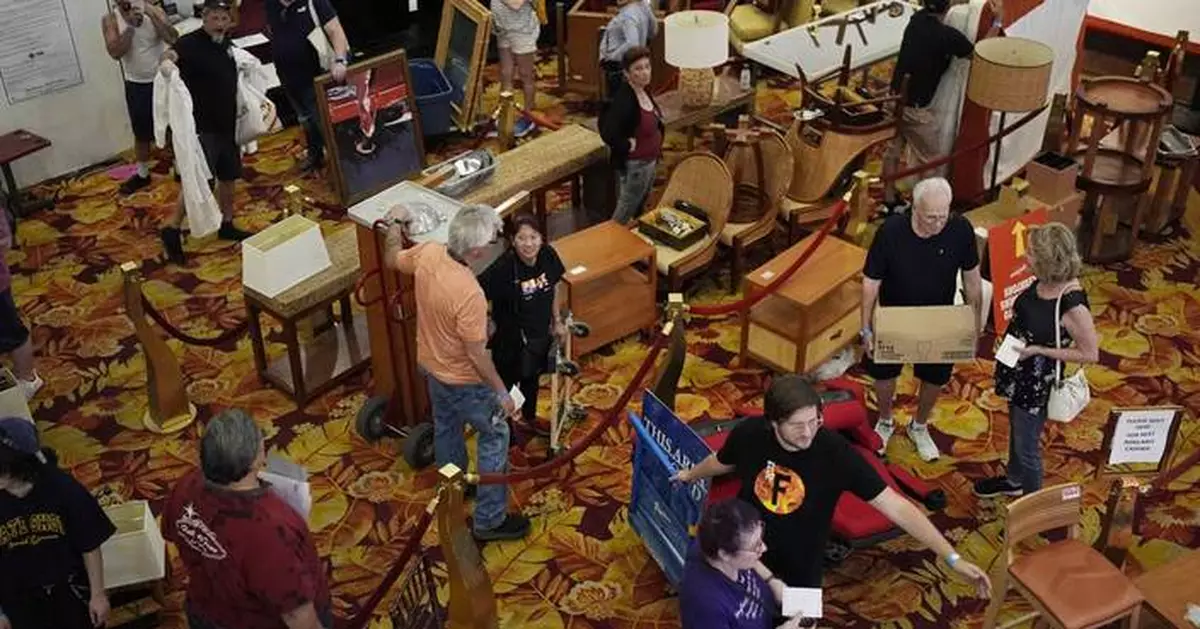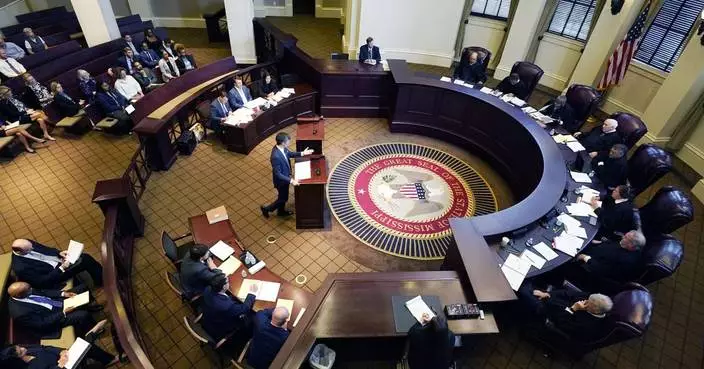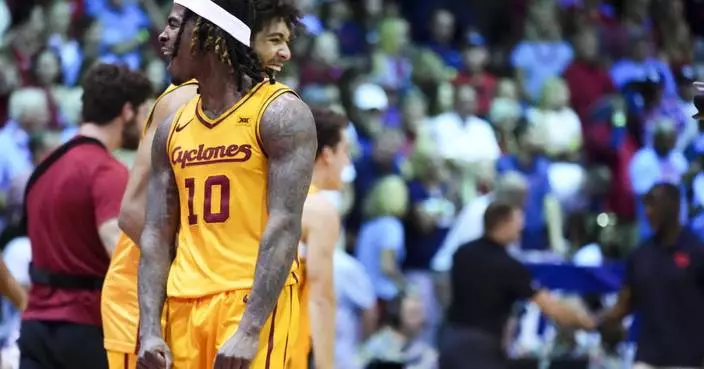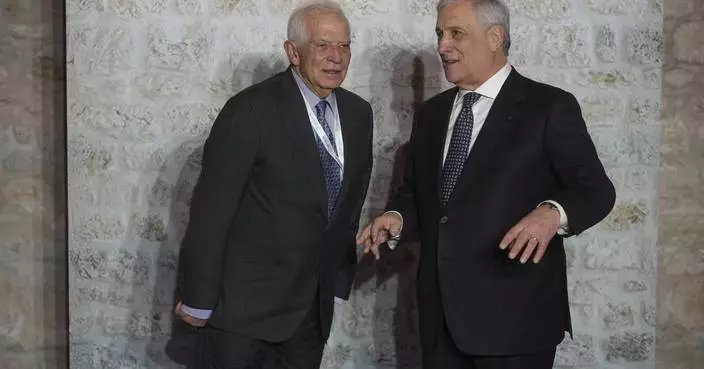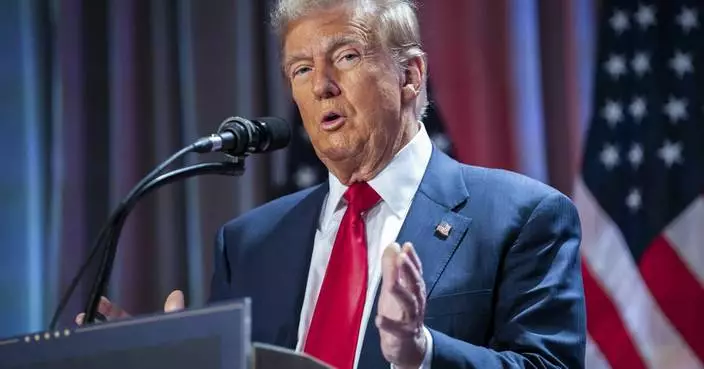LAS VEGAS (AP) — Crystal chandeliers that once glimmered above a swanky lounge, bright blue costume feathers that cloaked shimmying showgirls, and fake palm trees that evoked a desert oasis are just some the artifacts making their way from the latest casino graveyards of Las Vegas into Sin City history.
The kitsch comes from the Tropicana, which was demolished in a spectacular implosion Oct. 9 to make room for a new baseball stadium; and from The Mirage, the Strip's first megaresort, which dealt its last cards in July and is set to reopen as a new casino nearly 40 years after it originally debuted.
Click to Gallery
People look at signs from defunct Las Vegas casinos on display at the Neon Museum, Wednesday, April 3, 2024, in Las Vegas. (AP Photo/John Locher)
Items for sale fill the the former casino floor at the shuttered Tropicana hotel-casino Saturday, May 25, 2024, in Las Vegas. (AP Photo/John Locher)
People look at signs from defunct Las Vegas casinos on display at the Neon Museum, Wednesday, April 3, 2024, in Las Vegas. (AP Photo/John Locher)
A person looks at a pile of pillows for sale at the shuttered Tropicana hotel-casino Saturday, May 25, 2024, in Las Vegas. (AP Photo/John Locher)
People look at items for sale at the shuttered Tropicana hotel-casino Saturday, May 25, 2024, in Las Vegas. (AP Photo/John Locher)
People walk by a sign for the Tropicana on display at the Neon Museum, Wednesday, April 3, 2024, in Las Vegas. (AP Photo/John Locher)
People line up to pay for items during a sale at the shuttered Tropicana hotel-casino Saturday, May 25, 2024, in Las Vegas. (AP Photo/John Locher)
As the neon lights dimmed and the final chips were cashed in, a different kind of spectacle unfolded behind the casino doors. Millions of items big and small were meticulously sorted and sold, donated and discarded.
“You take this hotel-casino and you turn it upside down, shake everything out of it until it’s empty,” said Frank Long, whose family business, International Content Liquidations, led the effort to unload the Tropicana's merchandise before its implosion.
Long, 70, a third-generation auctioneer, likes to say he’s in the business of “going, going, gone." He jokes that his Ohio home is “decorated in early hotel,” having helped clear out dozens of them as well as casinos across the country. In Las Vegas, that includes the Dunes, Aladdin and Landmark.
“Vegas buyers are special,” Long said. “This is their community, and they want a piece of it.”
On a hot day in June, two months after the Tropicana shut its doors, Long welcomed buyers onto the casino floor.
The whirring slot machines were long gone, transferred to other casinos. In their place sat an odd collection of things: desks and chairs, rattan night stands, table lamps, pillows and sofas. Piled high in what was once the high-limit gambling room were mattresses and box springs. Small crystal chandeliers going for $1,000 hung suspended from old luggage carts.
“Fill up your entire truck for 100 bucks,” Long told shoppers, grinning.
Buyers of all ages filled wagons and luggage carts with arm chairs priced at $25, mirrors at $6, floor lamps at $28. Behind red velvet ropes where guests used to check in, customers waiting to pay stood in line with 43-inch flatscreen televisions. One man hugged a mattress and box spring, trying to keep them from toppling over.
In the Tropicana's vast conference hall, piles of large vintage spotlights labeled “FOLIES” sat in waist-high bins marked for donation. They were off-limits to buyers, destined for the Las Vegas Showgirl Museum.
The Tropicana was home to the city’s longest-running show, “Folies Bergere,” a topless revue imported from Paris. Its nearly 50-year run helped make the feathered showgirl one of the most recognizable Las Vegas icons.
One of Long's favorite parts about the job is sifting through forgotten corners of casinos.
Inside the Tropicana, his team rescued black-and-white photographs of stars who wined, dined and headlined there. His favorite was a candid photo of Elvis Presley found in an unused office.
In its heyday, the casino played host to A-list stars including Elizabeth Taylor and Debbie Reynolds, Frank Sinatra and Sammy Davis Jr.
Long said his people have fun with the job, too. The tedium of collecting several thousand pillows from the Tropicana's two hotel towers turned into “the world's biggest pillow fight."
When Sarah Quigley learned the Tropicana was closing, she knew she needed to act fast if she wanted some of the casino's historical records for the Special Collections and Archives at the University of Nevada, Las Vegas.
Quigley, director of the special collections, wasn't the first to call.
But after a meeting with the Tropicana's management team, UNLV's special collections acquired five boxes of records from 1956 to 2024, including vintage 1970s ads for the Tropicana's showroom, old restaurant menus, architectural blueprints and original film reels of the dancing “Folies” showgirls rehearsing in the mid-1970s.
The Neon Museum, which rescues iconic Las Vegas signs, got the Tropicana’s red one and The Mirage’s original archway that welcomed guests for 35 years. In a herculean effort, the 30-foot sign was placed on a flatbed truck in August. A chunk of the Strip closed so the piece could be slowly driven to its new home at the museum.
The Mirage opened with a Polynesian theme in 1989, spurring a building boom on the Strip that stretched through the 1990s. Its volcano fountain was one of the first sidewalk attractions, and tourists flocked to the casino to see Cirque du Soleil set to The Beatles or Siegfried and Roy taming white tigers.
In just a few years, the Strip's skyline will look different. The Mirage will become the Hard Rock Las Vegas in 2027, with a hotel tower shaped like a guitar. The following year, the new baseball stadium is expected to open on the former site of the Tropicana.
While the last of the Tropicana's buildings came tumbling down in 22 seconds, pieces of the Las Vegas landmark have found a new life in nearby museums, curated collections and homes.
“There's history here,” said Aaron Berger, executive director of the Neon Museum. “You just have to look past the glitter to find it."
Associated Press video journalist Ty O'Neil in Las Vegas contributed to this report.
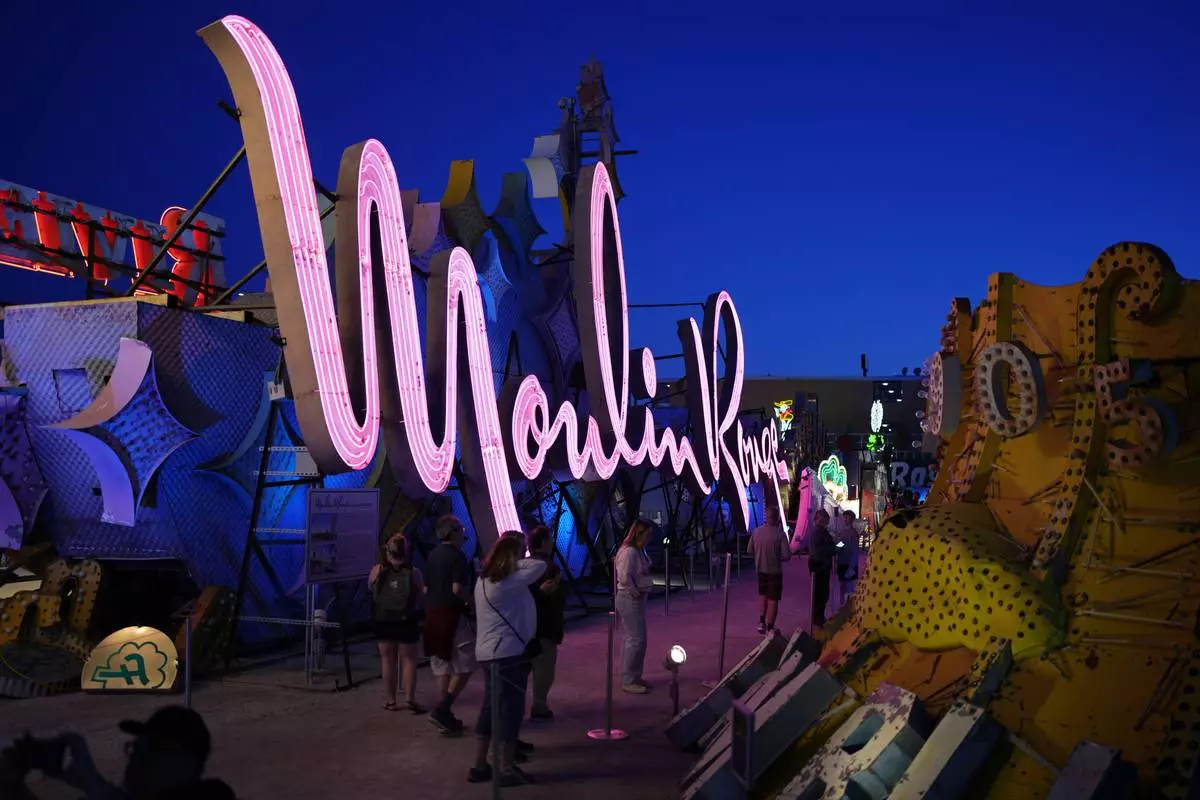
People look at signs from defunct Las Vegas casinos on display at the Neon Museum, Wednesday, April 3, 2024, in Las Vegas. (AP Photo/John Locher)
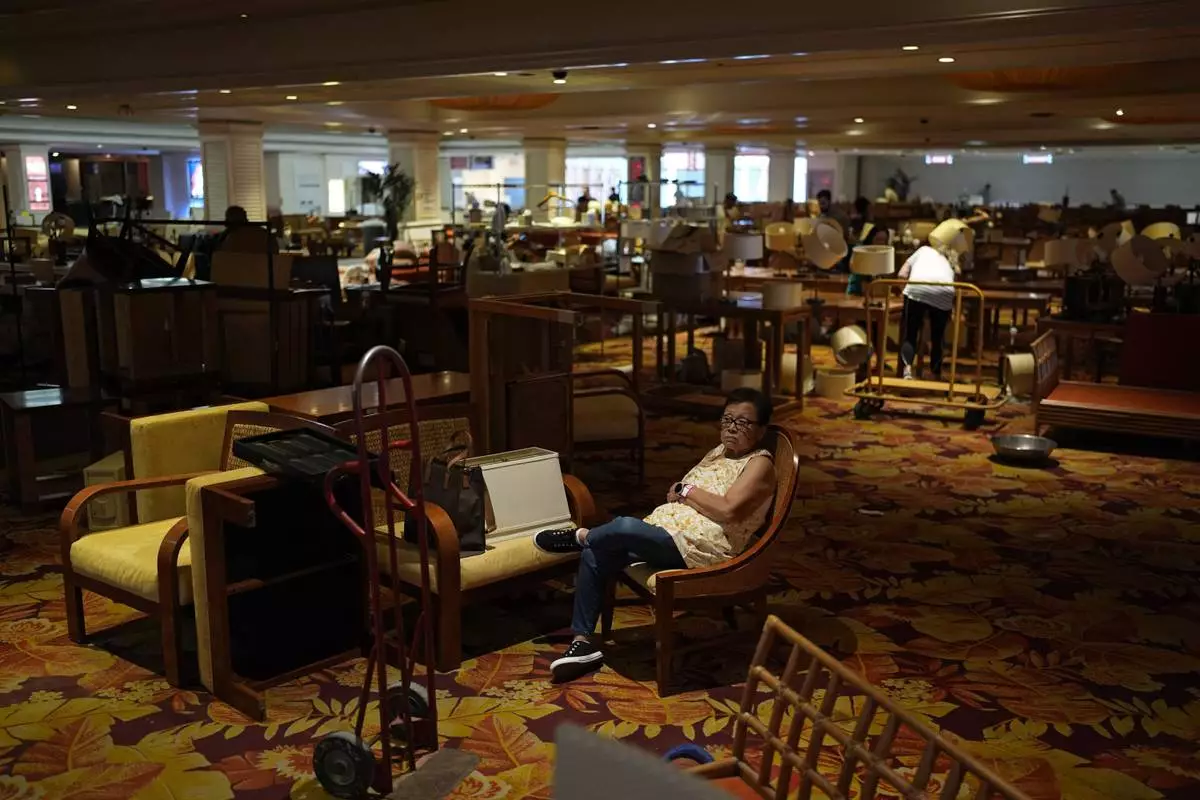
Items for sale fill the the former casino floor at the shuttered Tropicana hotel-casino Saturday, May 25, 2024, in Las Vegas. (AP Photo/John Locher)
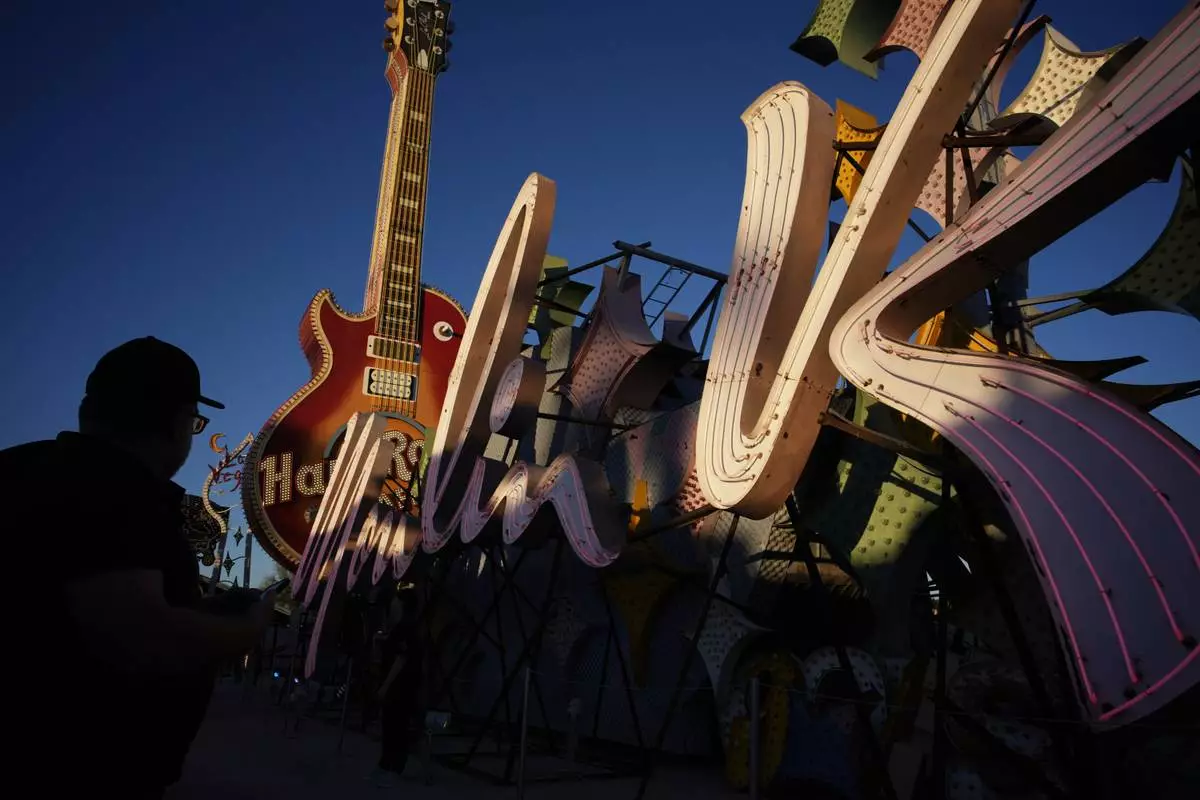
People look at signs from defunct Las Vegas casinos on display at the Neon Museum, Wednesday, April 3, 2024, in Las Vegas. (AP Photo/John Locher)
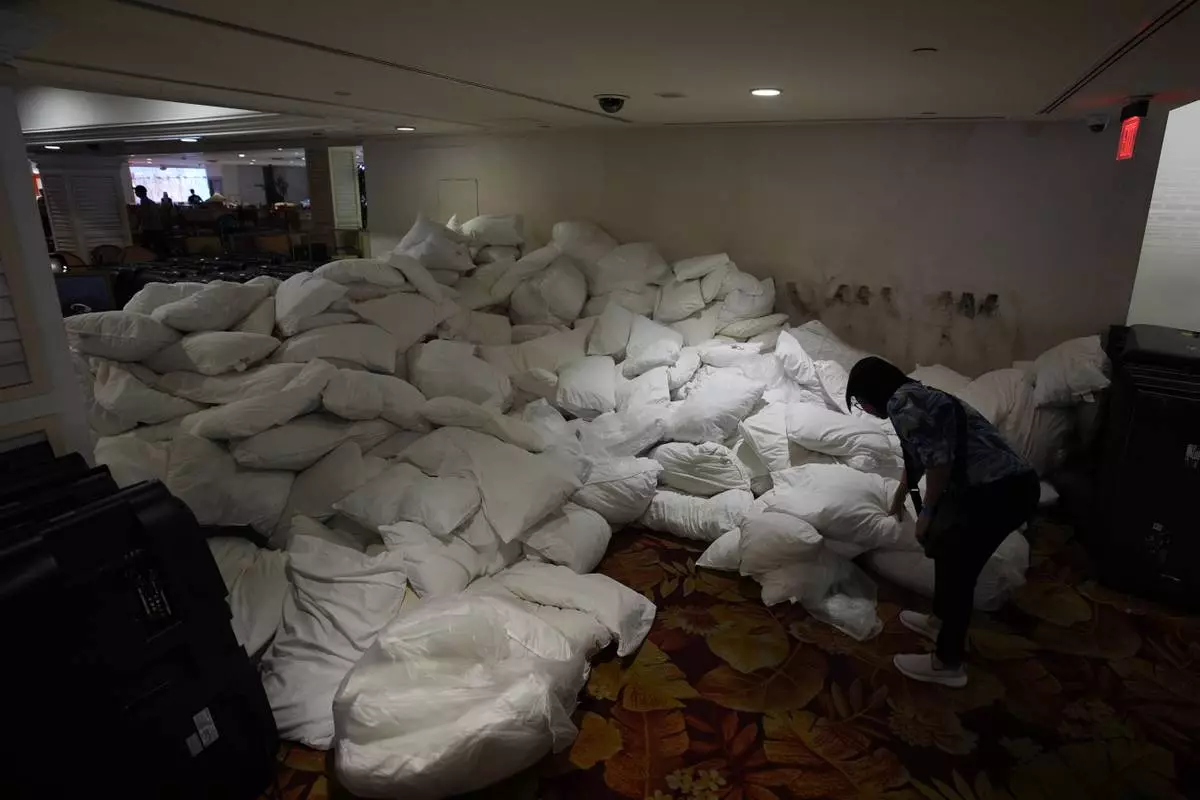
A person looks at a pile of pillows for sale at the shuttered Tropicana hotel-casino Saturday, May 25, 2024, in Las Vegas. (AP Photo/John Locher)
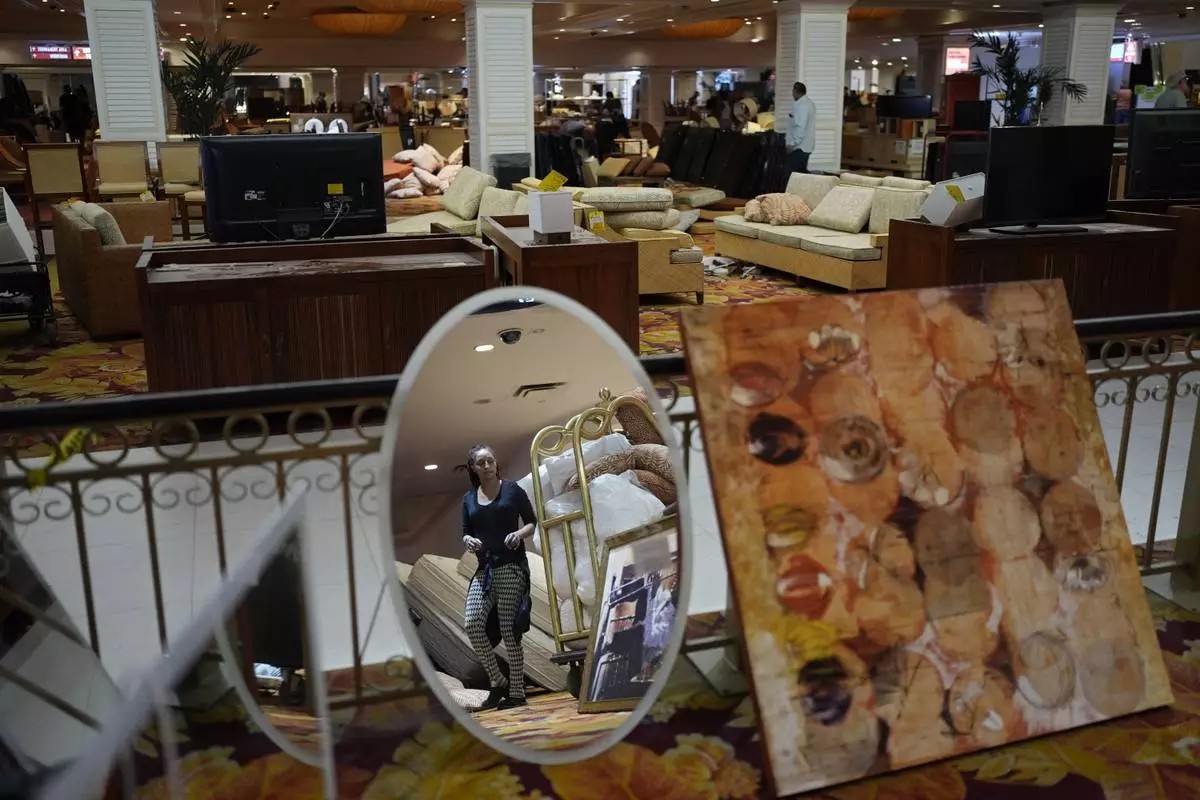
People look at items for sale at the shuttered Tropicana hotel-casino Saturday, May 25, 2024, in Las Vegas. (AP Photo/John Locher)
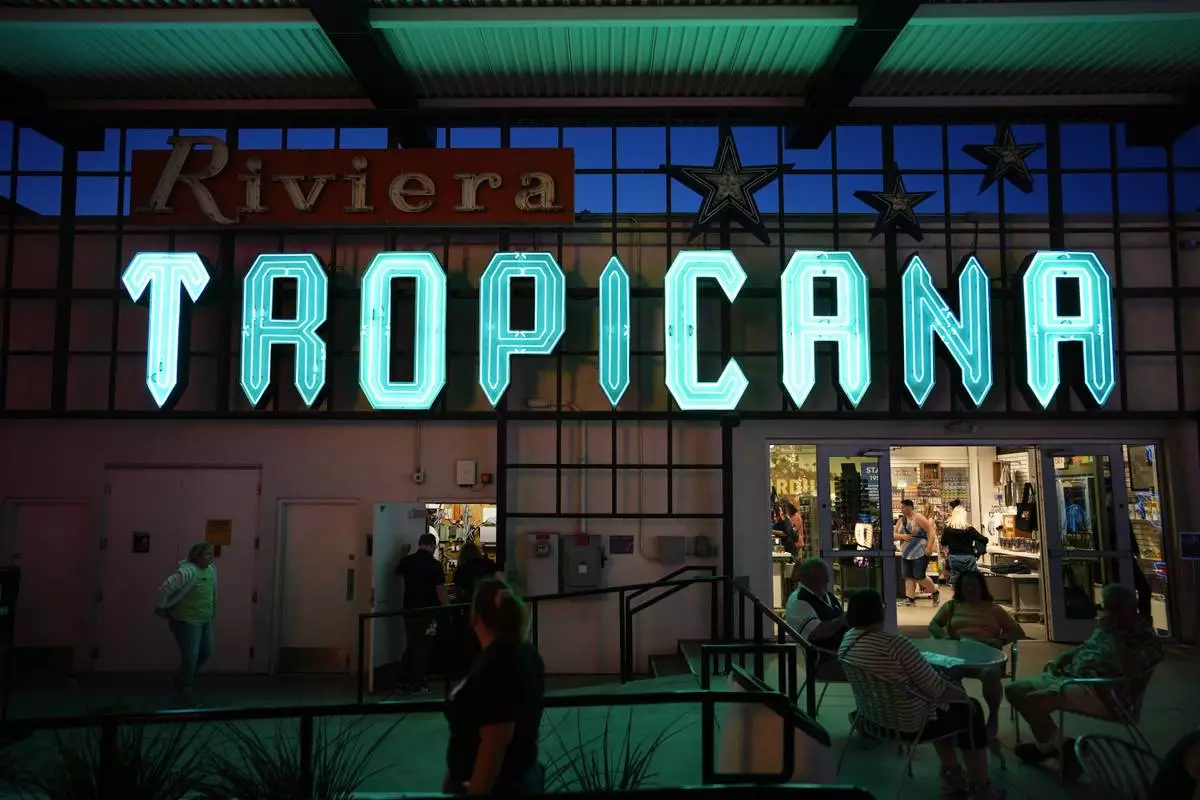
People walk by a sign for the Tropicana on display at the Neon Museum, Wednesday, April 3, 2024, in Las Vegas. (AP Photo/John Locher)
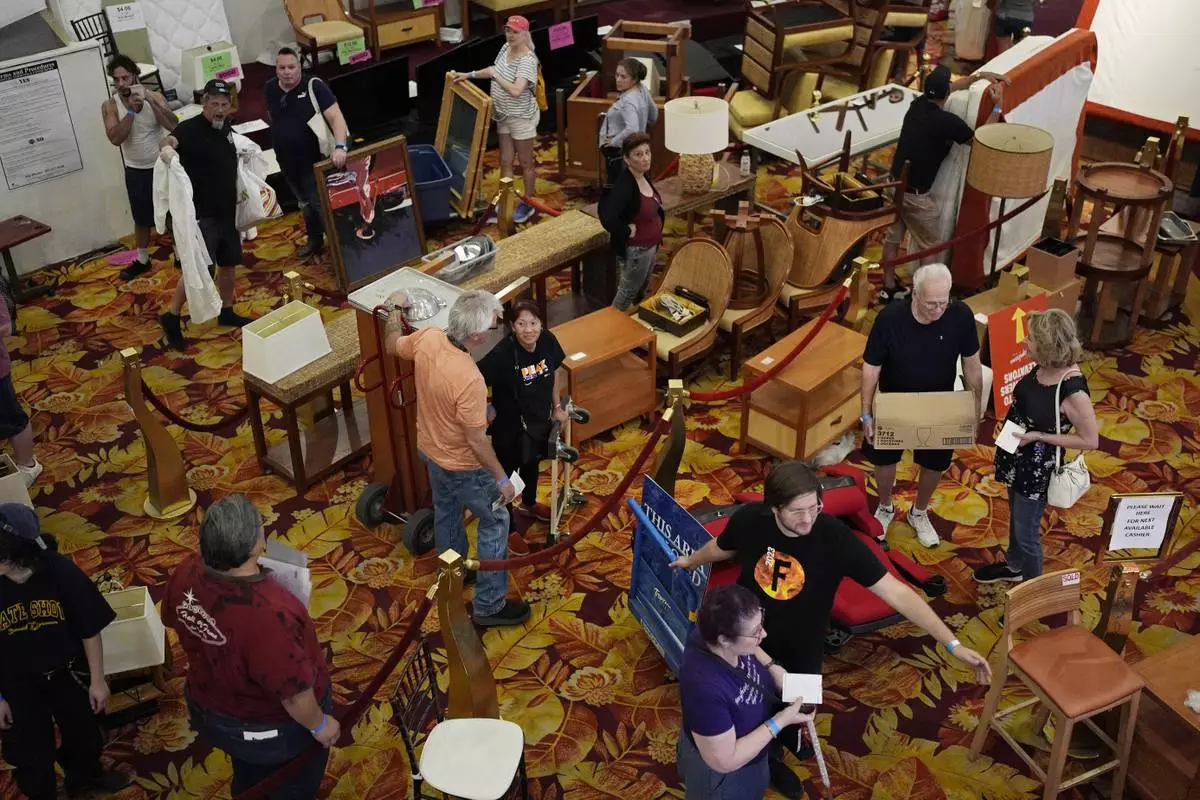
People line up to pay for items during a sale at the shuttered Tropicana hotel-casino Saturday, May 25, 2024, in Las Vegas. (AP Photo/John Locher)
NEW YORK (AP) — Walmart's sweeping rollback of its diversity policies is the strongest indication yet of a profound shift taking hold at U.S. companies that are re-evaluating the legal and political risks associated with bold programs to bolster historically underrepresented groups.
The changes announced by the world's biggest retailer on Monday followed a string of legal victories by conservative groups that have filed an onslaught of lawsuits challenging corporate and federal programs aimed at elevating minority and women-owned businesses and employees.
The retreat from such programs crystalized with the election of former President Donald Trump, whose administration is certain to make dismantling diversity, equity and inclusion programs a priority. Trump's incoming deputy chief of policy will be his former adviser Stephen Miller, who leads a group called America First Legal that has aggressively challenged corporate DEI policies.
“There has been a lot of reassessment of risk looking at programs that could be deemed to constitute reverse discrimination,” said Allan Schweyer, principal researcher at the Human Capital Center at the Conference Board.
“This is another domino to fall and it is a rather large domino,” he added.
Among other changes, Walmart said it will no longer give priority treatment to suppliers owned by women or minorities. The company also will not renew a five-year commitment for a racial equity center set up in 2020 after the police killing of George Floyd. And it pulled out of a prominent gay rights index.
Schweyer said the biggest trigger for companies making such changes is simply a reassessment of their legal risk exposure, which began after U.S. Supreme Court’s ruling in June 2023 that ended affirmative action in college admissions. Since then, conservative groups using similar arguments have secured court victories against various diversity programs, especially those that steer contracts to minority or women-owned businesses.
Most recently, the conservative Wisconsin Institute for Law & Liberty won a victory in a case against the U.S. Department of Transportation over its use of a program that gives priority to minority-owned businesses when it awards contracts.
Companies are seeing a big legal risk in continuing with DEI efforts, said Dan Lennington, a deputy counsel at the institute. His organization says it has identified more than 60 programs in the federal government that it considers discriminatory, he said.
“We have a legal landscape within the entire federal government, all three branches -- the U.S. Supreme Court, the Congress and the President -- are all now firmly pointed in the direction towards equality of individuals and individualized treatment of all Americans, instead of diversity, equity and inclusion treating people as members of racial groups,” Lennington said.
The Trump administration is also likely to take direct aim at DEI initiatives through executive orders and other policies that affect private companies, especially federal contractors.
“The impact of the election on DEI policies is huge. It can’t be overstated,” said Jason Schwartz, co-chair of the Labor & Employment Practice Group at law firm Gibson Dunn.
With Miller returning to the White House, rolling back DEI initiatives is likely to be a priority, Schwartz said.
“Companies are trying to strike the right balance to make clear they’ve got an inclusive workplace where everyone is welcome, and they want to get the best talent, while at the same time trying not to alienate various parts of their employees and customer base who might feel one way or the other. It’s a virtually impossible dilemma,” Schwartz said.
Marc Morial, CEO of the National Urban League, a civil rights group that has worked with Walmart on diversity and inclusion efforts in the past, called the company's pullback from DEI “stunning" and “unexpected.”
“This is inconsistent with the Walmart I know,” said Morial, who argued that DEI policies are how organizations ensure compliance with federal anti-discrimination laws like the Civil Rights Act of 1964 and any suggestion of favoritism or preferential treatment “is really defamatory against what DEI represents.”
He said that Walmart would see “a strong message” to the decision but that civil rights leaders “are first very interested in dialogue” with Walmart executives.
A recent survey by Pew Research Center showed that workers are divided on the merits of DEI policies. While still broadly popular, the share of workers who said focusing on workplace diversity was mostly a good thing fell to 52% in the October survey, compared to 56% in a similar survey in February 2023. Rachel Minkin, a research associate at Pew, called it a small but significant shift in short amount of time.
There will be more companies pulling back from their DEI policies, but it likely won’t be a retreat across the board, said David Glasgow, executive director of the Meltzer Center for Diversity, Inclusion and Belonging at New York University.
“There are vastly more companies that are sticking with DEI," Glasgow said. "The only reason you don’t hear about it is most of them are doing it by stealth. They’re putting their heads down and doing DEI work and hoping not to attract attention.”
Glasgow advises organizations to stick to their own core values, because attitudes toward the topic can change quickly in the span of four years.
“It’s going to leave them looking a little bit weak if there’s a kind of flip-flopping, depending on whichever direction the political winds are blowing,” he said.
One reason DEI programs exist is because without those programs, companies may be vulnerable to lawsuits for traditional discrimination. “Really think carefully about the risks in all directions on this topic,” Glasgow said.
Walmart confirmed will no longer consider race and gender as a litmus test to improve diversity when it offers supplier contracts. Walmart says its U.S. businesses sourced more than $13 billion in goods and services from diverse suppliers in fiscal year 2024, including businesses owned by minorities, women and veterans.
It was unclear how its relationships with such business would change going forward. Organizations that have partnered with Walmart on its diversity initiatives offered a cautious response.
The Women’s Business Enterprise National Council, a non-profit that last year named Walmart one of America's top corporation for women-owned enterprises, said it was still evaluating the impact of Walmart's announcement.
Pamela Prince-Eason, the president and CEO of the organization, said she hoped Walmart's need to cater to its diverse customer base will continue to drive contracts to women-owned suppliers even if the company has no explicit dollar goals.
“I suspect Walmart will continue to have one of the most inclusive supply chains in the World,” Prince-Eason wrote. “Any retailer's ability to serve the communities they operate in will continue to value understanding their customers, (many of which are women), in order to better provide products and services desired and no one understands customers better than Walmart."
Walmart's announcement came after the company spoke directly with conservative political commentator and activist Robby Starbuck, who has been going after corporate DEI policies, calling out individual companies on the social media platform X. Several of those companies have subsequently announced that they are pulling back their initiatives, including Ford, Harley-Davidson, Lowe’s and Tractor Supply.
Walmart confirmed to The Associated Press that it will better monitor its third-party marketplace items to make sure they don’t feature sexual and transgender products aimed at minors. The company also will stop participating in the Human Rights Campaign’s annual benchmark index that measures workplace inclusion for LGBTQ+ employees.
A Walmart spokesperson added that some of the changes were already in progress and not as a result of conversations that it had with Starbuck.
RaShawn “Shawnie” Hawkins, senior director of the HRC Foundation’s Workplace Equality Program, said companies that “abandon” their commitments workplace inclusion policies “are shirking their responsibility to their employees, consumers, and shareholders.” She said the buying power of LGBTQ customers is powerful and noted that the index will have record participation of more than 1,400 companies in 2025.
Associated Press Staff Writer Matt Brown in Washington contributed to this report.

FILE - A Walmart logo is displayed outside of a Walmart store, in Walpole, Mass., Sept. 3, 2019. (AP Photo/Steven Senne, File)
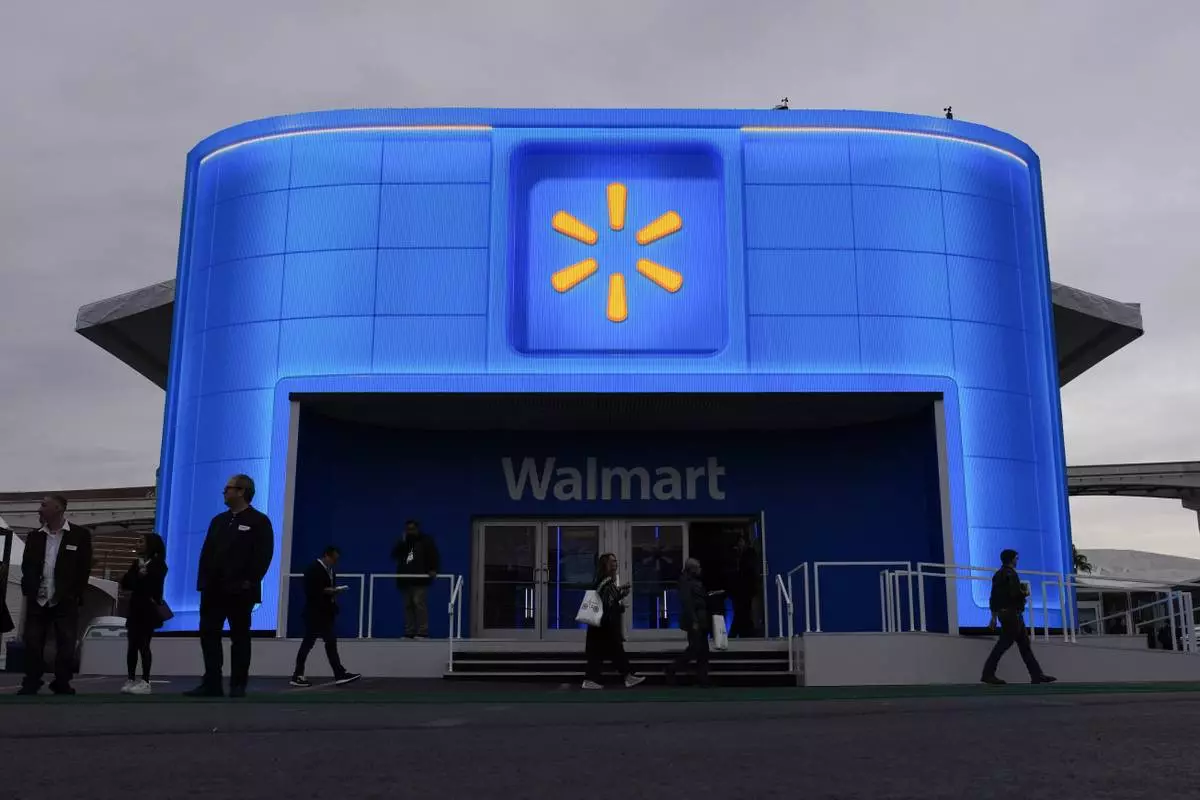
FILE - People walk by the Walmart booth during the CES tech show on Jan. 9, 2024, in Las Vegas. (AP Photo/John Locher, File)









